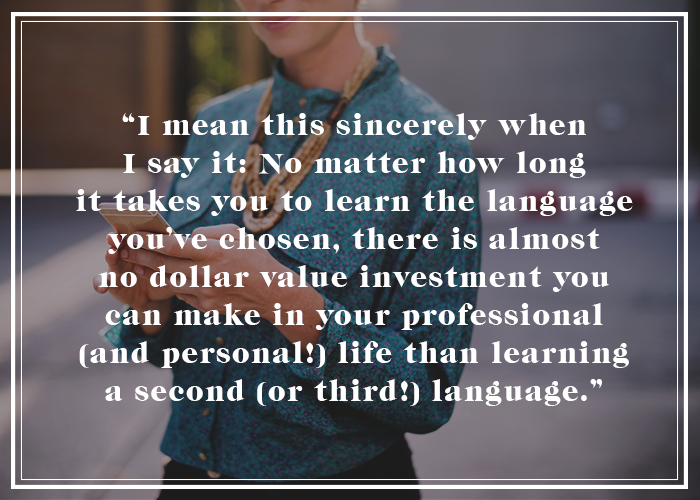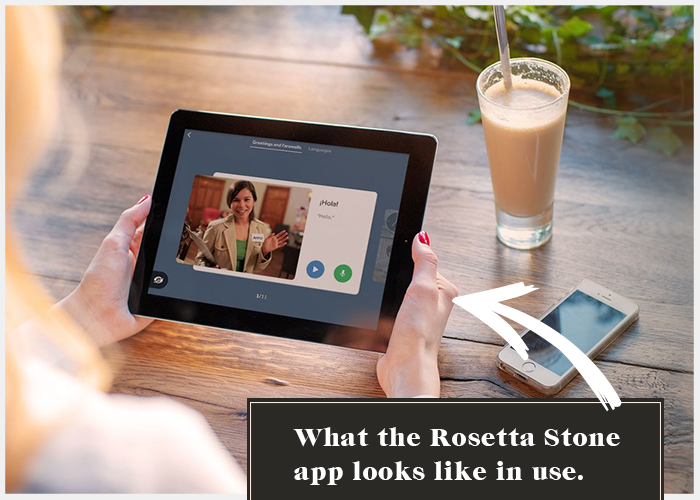The Best Money You Can Spend On Your Career
The Financial Diet has partnered with Rosetta Stone to talk about language, learning, and how to make more out of your professional life (without going into crazy grad school debt).
As a lot of you probably know, I didn’t graduate from college. I didn’t have a traditional path of internships, or post-grad networking, or an alumni network to help me in the search. After a few years at community college, I continued my studies in France (because it was, for four-year university, about the price of community college for an American), and then dropped out prematurely when I started writing full-time. There have been a lot of benefits to this path: I have almost no debt, I’ve been able to earn money while studying, and been able to follow career opportunities as they came to me. But I also realize that my path — both in school, and immediately following it — was in many ways dictated by a singular aspect of my skill set: I am bilingual.
I started learning French fairly young, around the end of elementary school, doubled up each year with as many French-language classes as I could take all the way through my college years in America, and supplemented my studies with frequent calls to my Francophone grandmother, who was always eager to help me learn and keep me motivated. At home almost every evening, I’d pop in the Rosetta Stone CD-Rom I had checked out from my school library and practice the lessons I had the hardest time with (grammar always killed me). And the all-encompassing, almost romantic way I was learning felt more meaningful to me than anything I did in school. I’d always been a terrible, lazy student, uninterested in half the subjects I was required to take — if I could master at least one very-tangible skill, I’d always be employable.
And it turns out that this decision to become fluent in French came in deeply-handy when I was looking at schools to transfer to from community college, and quickly realizing that all of my top choices would put me deeply in debt. I could work — and go to school! — in Paris, live on very little money, and get the degree I wanted for a fraction of a fraction of the cost Stateside. The fact that this path was open to me was uniquely because of my bilingual status, and the fact that I was able to supplement my transition into writing full-time by tutoring freelance in French and English was yet another privilege provided by my language skills. In short, being bilingual allowed me to shape my young life and follow the career opportunities as they came to me, and continue to open doors even as my work life becomes more and more established.
Recently — as in, starting with some seriousness about three months ago — I started giving Spanish a serious go as well, and perhaps because of my incessant tweeting on the subject, Rosetta Stone has partnered up with TFD to talk about the art (and professional imperative) of language-learning. In addition to my bi-weekly sessions with a tutor and constant listening-to-Spanish-media training, I’ve added the Rosetta Stone app to the mix, and to great result. (I use it on my phone about once a day, usually while on the subway or lying in bed first thing in the morning. And it’s a subscription service, which is flexible and allows me to subscribe to something a little more productive than TV shows I binge watch and a monthly box of makeup samples.)

I’m someone who believes heavily that the best way to learn a language is through constant, ambient exposure — nothing replaces the act of forcing yourself to speak it, and to get over the embarrassment in doing so — but eventually one needs to build out the more technical structure of the language. It’s not enough to just get by: you must add to your arsenal of verbs, of complex conjugations, of little-used nouns: apps like the newly-relaunched Rosetta Stone are perfect to flesh out your knowledge in the language. Aside from the convenience and ambient presence of app learning (integrating language-learning into the quiet moments of your life, like a commute or just before bed, makes it feel less like a chore and more like a personal habit), there were a few things I found about the new Rosetta Stone that are key in my experience to learning effectively:
-
Lessons are not just divided by category (shopping, traveling, etc), but also by type of learning (grammar, nouns, etc), which allows you to fill in just the gaps you need without having to rehash stuff you’re already comfortable with.
- The subscription model is less expensive than buying the entire program (like you previously had to), with less commitment!
- Nearly everything you learn — not just certain words — are said out loud if you have the volume on, which means that you’re getting to hear basically everything for your pronunciation and listening comprehension. Rosetta Stone also listens to you using TruAccent, which checks your speech a 100 times a second to make sure your pronunciation is on par with the native pronunciation and helps you correct it, allowing you to speak more authentically.
- Unlike a lot of other apps I’ve used, the progression of learning is much closer to actual immersion than a class-like setting, where it’s harder to develop quickly. You don’t do advanced, complicated verb forms before getting through crucial basics, like ordering food or asking questions.
- There are live studio sessions led by native speaking language tutors (available for in-product purchase)—Francophone grandmother not required
- The design is also just really pretty and easy-to-navigate which, let’s be honest, is always great.
I mean this sincerely when I say it: No matter how long it takes you to learn the language you’ve chosen, there is almost no dollar-value investment you can make in your professional (and personal!) life than learning a second (or third!) language. The doors that open to you when you are fluent in more than one language are endless: you can teach, you can live and work in other countries, you can be an asset to companies that straddle both, you can work in translation, you can pursue degrees in other countries, you can interact with twice the clients or colleagues. To do nearly any job in more than one language — even if the job itself has nothing to inherently do with language — is to automatically add another layer to it which is greater than the sum of its parts.
You become a connector, a facilitator, and someone who can understand the unique needs of two totally-disparate markets and consumers. As a fairly-savvy media entrepreneur, I have often thought of eventually teaching some element of digital media in a French university, where the subject is sorely understaffed. And one of the most pressing reasons I would love to learn Spanish is because the Spanish-language market for nearly any media company in America is huge, and so often goes untapped.
I am someone who is living proof that learning a language can be a cheat code to your education, to your professional path, and to the options afforded to you in life. And while there will always be different strategies and habits that work for you when it comes to learning a language, finding an easy-to-use program that helps build out the foundations of your learning will always be indispensable. As someone who used Rosetta Stone all the way back in middle school when I was first getting a grip of French, and is now using it today on the road to becoming officially trilingual (how chic!), I can’t recommend it to you enough. Download Rosetta Stone (you can try a free demo here!) today, and start speaking the language of your future.



